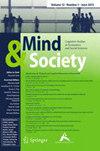Positive-Negative Affectivity and Decision Making Among Mindfulness Meditators and Non-Meditators
Q1 Arts and Humanities
引用次数: 0
Abstract
Mindfulness has gained significant attention in recent years due to its potential benefits for cognitive and emotional processes. However, how mindfulness interplays with affect to exert its effect on decision-making remains relatively less explored. The present study examined and compared the performance of both mindfulness meditators and non-meditators on decisionmaking tasks under different affective states. A total of 100 participants (50 mindfulness meditators and 50 non-meditators) responded to the Five Facet Mindfulness Questionnaire (FFMQ) and performed the Iowa Gambling Task (IGT). Both groups were further divided into positive affect and negative affect conditions. The International Affective Picture System (IAPS) was used to induce positive and negative affective states among the participants. The baseline affective state of the participants was assessed using the Positive and Negative Affect Schedule (PANAS). Independent sample t-tests and a univariate ANOVA were computed to analyze the obtained data. Results showed that mindfulness meditators scored significantly higher on the total FFMQ as well as on its different facets. Furthermore, the results revealed a significant main effect of mindfulness and the affect group on IGT performance. The interaction between mindfulness and affective conditions was also found to be significant. Mindfulness meditators performed equally well on IGT under both positive and negative affect conditions, whereas non-meditators performed better only under positive affect conditions. The findings have practical implications, as they suggest that mindfulness meditation enhances decision-making by promoting effective emotion regulation and suppressing impulsive responses during decision-making in different domains of life.正念冥想者与非冥想者的积极-消极情感与决策
近年来,正念因其对认知和情感过程的潜在益处而受到了极大的关注。然而,正念如何与情感相互作用,从而对决策产生影响,这方面的研究相对较少。本研究考察并比较了正念冥想者和非冥想者在不同情感状态下的决策任务表现。共有100名参与者(50名正念冥想者和50名非冥想者)回答了五方面正念问卷(FFMQ)并执行了爱荷华赌博任务(IGT)。两组都被进一步分为积极情绪和消极情绪。采用国际情感画面系统(IAPS)诱导被试的积极和消极情感状态。使用积极和消极情绪量表(PANAS)评估参与者的基线情感状态。计算独立样本t检验和单变量方差分析来分析获得的数据。结果显示,正念冥想者在整体FFMQ及其不同方面的得分明显更高。此外,研究结果还揭示了正念和情绪组对IGT表现的显著主效应。正念和情感状态之间的相互作用也被发现是显著的。正念冥想者在积极和消极情绪条件下的IGT表现都一样好,而非冥想者只有在积极情绪条件下才表现得更好。这些发现具有实际意义,因为它们表明正念冥想通过促进有效的情绪调节和抑制生活中不同领域决策过程中的冲动反应来提高决策能力。
本文章由计算机程序翻译,如有差异,请以英文原文为准。
求助全文
约1分钟内获得全文
求助全文
来源期刊

Mind and Society
Arts and Humanities-Philosophy
CiteScore
2.30
自引率
0.00%
发文量
5
期刊介绍:
Mind & Society is a journal for ideas, explorations, investigations and discussions on the interaction between the human mind and the societal environments. Scholars from all fields of inquiry who entertain and examine various aspects of these interactions are warmly invited to submit their work. The journal welcomes case studies, theoretical analysis and modeling, data analysis and reports (quantitative and qualitative) that can offer insight into existing frameworks or offer views and reason for the promise of new directions for the study of interaction between the mind and the society. The potential contributors are particularly encouraged to carefully consider the impact of their work on societal functions in private and public sectors, and to dedicate part of their discussion to an explicit clarification of such, existing or potential, implications.Officially cited as: Mind Soc
 求助内容:
求助内容: 应助结果提醒方式:
应助结果提醒方式:


